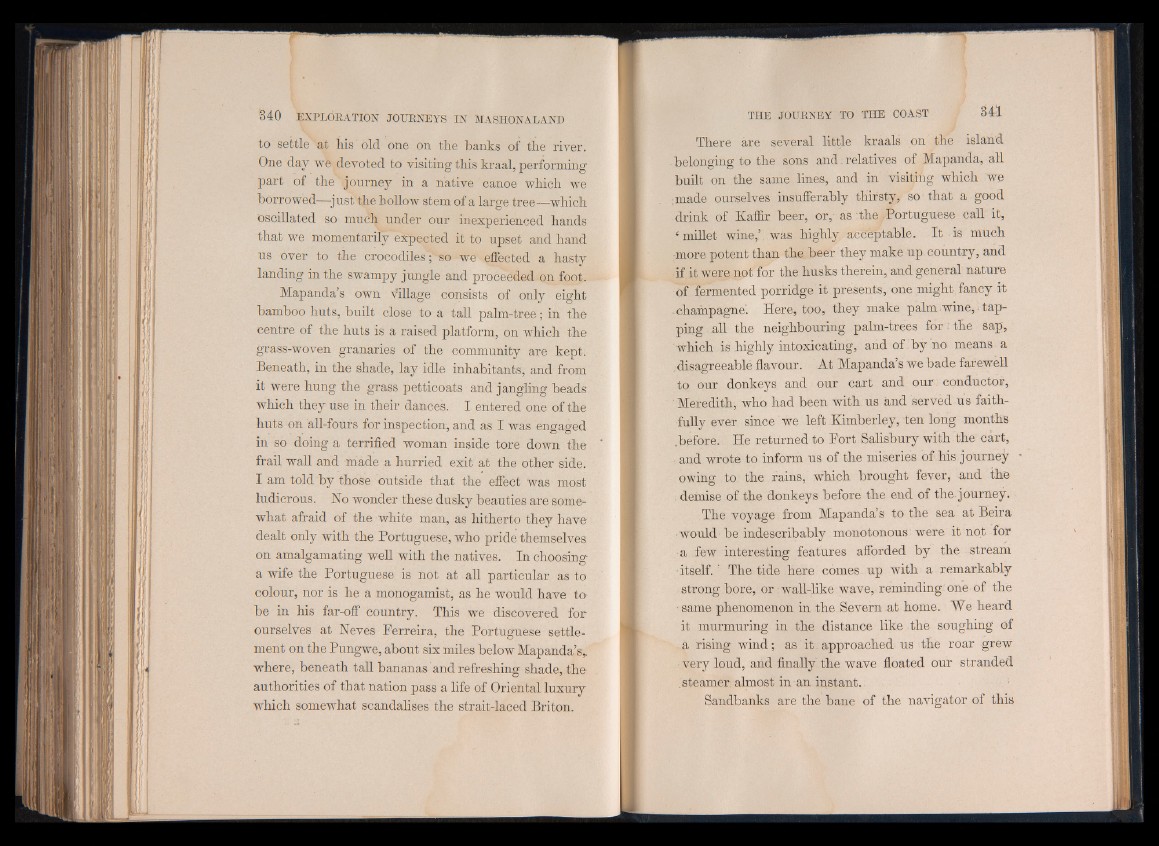
to settle sat his old one on the hanks of the river.
One day we devoted to visiting this kraal, performing
part of the journey in a native canoe which we
borrowed—just the hollow stem of a large tree—which
Oscillated so much under our inexperienced hands
that we momentarily expected it to upset and hand
us over to the crocodiles y so we-.effected a hasty
landing in the swampy jungle and proceeded on foot.
Mapanda’s own village consists of only eight
bamboo huts, built close to a tall palm-tree; in the
centre of the huts is a raised platform, on which the
grass-woven granaries of the community are kept.
Beneath, in the shade, lay idle inhabitants, and from
it were hung the grass petticoats and jangling beads
which they use in their dances. I entered one of the
huts on all-fours for inspection, and as I was engaged
in so doing a terrified woman inside tore down the
frail wall and made a hurried exit at the other side.
I am told by those outside that the effect was most
ludicrous. No wonder these dusky beauties are somewhat
afraid of the white man, as hitherto they have
dealt only with the Portuguese, who pride themselves
on amalgamating well with the natives. In choosing
a wife the Portuguese is not at all particular as to
colour, nor is he a monogamist, as he would have to
be in his far-off country. This we discovered for
ourselves at Neves Ferreira, the Portuguese settlement
on the Pungwe, about six miles below Mapanda’s,.
where, beneath tall bananas and refreshing shade, the
authorities of that nation pass a life of Oriental luxury
which somewhat scandalises the strait-laced Briton.
There are several little kraals on the island
.belonging to the sons and. relatives of Mapanda, all
built on the same lines, and in visiting which we
•.made ourselves insufferably thirsty, so that a good
drink of Kaffir beer, or,' as the .Portuguese call it,
‘ millet, wine,’ was highly acceptable. It is much
-more potent than the beer they make up country, and
if it were not for the husks therein, and general nature
of fermented porridge'it presents, one might fancy it
-champagne'. Here, too, they make palm wine,i tapping
all the neighbouring palm-trees fo r. the sap,
which is highly intoxicating, and of by no. means a
disagreeable flavour. At Mapanda’s we bade farewell
to our donkeys and our cart and our conductor,
Meredith, who had been with us and served us faithfully
ever since we left Kimberley, ten long months
.before. He returned to Fort Salisbury with the cart,
■ and wrote to inform us of the miseries of his journey
owing to the rains, which brought fever, and the
. demise of the donkeys before the end of the. journey.
The voyage from Mapanda’s to the sea at Beira
•would be indescribably monotonous were it not for
a few interesting features afforded by the stream
■itself. The tide here comes up with a remarkably
strong bore, or wall-like wave, reminding one of the
■ same phenomenon in the Severn at home. We heard
it murmuring in the distance like the soughing of
a rising wind; as i t /approached us the roar grew
very loud, and finally the wave floated our stranded
.steamer: almost in an instant.
Sandbanks are the bane of the navigator of this